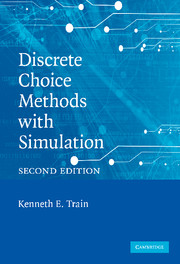6 - Mixed Logit
Published online by Cambridge University Press: 05 June 2012
Summary
Choice Probabilities
Mixed logit is a highly flexible model that can approximate any random utility model (McFadden & Train, 2000). It obviates the three limitations of standard logit by allowing for random taste variation, unrestricted substitution patterns, and correlation in unobserved factors over time. Unlike probit, it is not restricted to normal distributions. Its derivation is straightforward, and simulation of its choice probabilities is computationally simple.
Like probit, the mixed logit model has been known for many years but has only become fully applicable since the advent of simulation. The first application of mixed logit was apparently the automobile demand models created jointly by Boyd & Mellman (1980) and Cardell & Dunbar (1980). In these studies, the explanatory variables did not vary over decision makers, and the observed dependent variable was market shares rather than individual customers' choices. As a result, the computationally intensive integration that is inherent in mixed logit (as explained later) needed to be performed only once for the market as a whole, rather than for each decision maker in a sample. Early applications on customer-level data, such as Train et al. (1987a) and Ben-Akiva et al. (1993), included only one or two dimensions of integration, which could be calculated by quadrature. Improvements in computer speed and in our understanding of simulation methods have allowed the full power of mixed logits to be utilized. Among the studies to evidence this power are those by Bhat (1998a) and Brownstone & Train (1999) on cross-sectional data, and Erdem (1996), Revelt & Train (1998), and Bhat (2000) on panel data.
- Type
- Chapter
- Information
- Discrete Choice Methods with Simulation , pp. 134 - 150Publisher: Cambridge University PressPrint publication year: 2009
- 2
- Cited by



